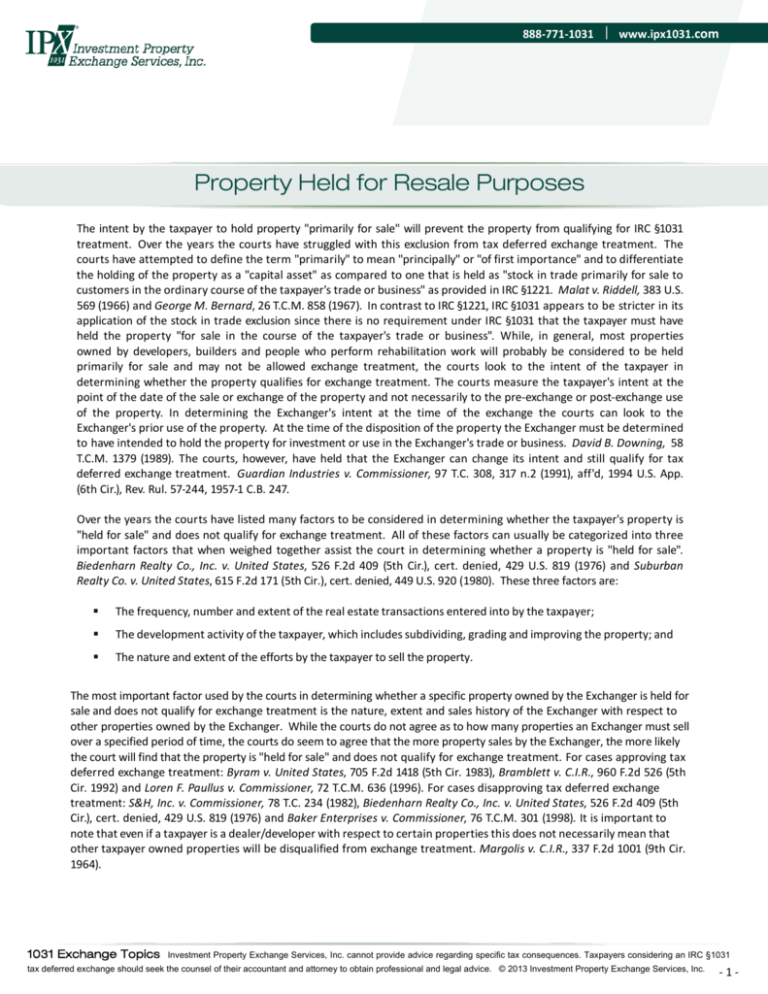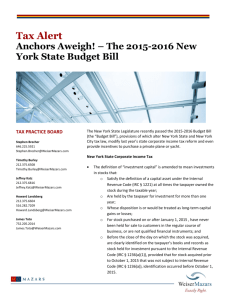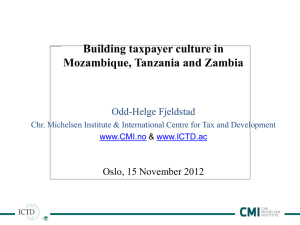Property Held for Resale Purposes
advertisement

888-771-1031 www.ipx1031.com Property Held for Resale Purposes The intent by the taxpayer to hold property "primarily for sale" will prevent the property from qualifying for IRC §1031 treatment. Over the years the courts have struggled with this exclusion from tax deferred exchange treatment. The courts have attempted to define the term "primarily" to mean "principally" or "of first importance" and to differentiate the holding of the property as a "capital asset" as compared to one that is held as "stock in trade primarily for sale to customers in the ordinary course of the taxpayer's trade or business" as provided in IRC §1221. Malat v. Riddell, 383 U.S. 569 (1966) and George M. Bernard, 26 T.C.M. 858 (1967). In contrast to IRC §1221, IRC §1031 appears to be stricter in its application of the stock in trade exclusion since there is no requirement under IRC §1031 that the taxpayer must have held the property "for sale in the course of the taxpayer's trade or business". While, in general, most properties owned by developers, builders and people who perform rehabilitation work will probably be considered to be held primarily for sale and may not be allowed exchange treatment, the courts look to the intent of the taxpayer in determining whether the property qualifies for exchange treatment. The courts measure the taxpayer's intent at the point of the date of the sale or exchange of the property and not necessarily to the pre-exchange or post-exchange use of the property. In determining the Exchanger's intent at the time of the exchange the courts can look to the Exchanger's prior use of the property. At the time of the disposition of the property the Exchanger must be determined to have intended to hold the property for investment or use in the Exchanger's trade or business. David B. Downing, 58 T.C.M. 1379 (1989). The courts, however, have held that the Exchanger can change its intent and still qualify for tax deferred exchange treatment. Guardian Industries v. Commissioner, 97 T.C. 308, 317 n.2 (1991), aff'd, 1994 U.S. App. (6th Cir.), Rev. Rul. 57-244, 1957-1 C.B. 247. Over the years the courts have listed many factors to be considered in determining whether the taxpayer's property is "held for sale" and does not qualify for exchange treatment. All of these factors can usually be categorized into three important factors that when weighed together assist the court in determining whether a property is "held for sale". Biedenharn Realty Co., Inc. v. United States, 526 F.2d 409 (5th Cir.), cert. denied, 429 U.S. 819 (1976) and Suburban Realty Co. v. United States, 615 F.2d 171 (5th Cir.), cert. denied, 449 U.S. 920 (1980). These three factors are: The frequency, number and extent of the real estate transactions entered into by the taxpayer; The development activity of the taxpayer, which includes subdividing, grading and improving the property; and The nature and extent of the efforts by the taxpayer to sell the property. The most important factor used by the courts in determining whether a specific property owned by the Exchanger is held for sale and does not qualify for exchange treatment is the nature, extent and sales history of the Exchanger with respect to other properties owned by the Exchanger. While the courts do not agree as to how many properties an Exchanger must sell over a specified period of time, the courts do seem to agree that the more property sales by the Exchanger, the more likely the court will find that the property is "held for sale" and does not qualify for exchange treatment. For cases approving tax deferred exchange treatment: Byram v. United States, 705 F.2d 1418 (5th Cir. 1983), Bramblett v. C.I.R., 960 F.2d 526 (5th Cir. 1992) and Loren F. Paullus v. Commissioner, 72 T.C.M. 636 (1996). For cases disapproving tax deferred exchange treatment: S&H, Inc. v. Commissioner, 78 T.C. 234 (1982), Biedenharn Realty Co., Inc. v. United States, 526 F.2d 409 (5th Cir.), cert. denied, 429 U.S. 819 (1976) and Baker Enterprises v. Commissioner, 76 T.C.M. 301 (1998). It is important to note that even if a taxpayer is a dealer/developer with respect to certain properties this does not necessarily mean that other taxpayer owned properties will be disqualified from exchange treatment. Margolis v. C.I.R., 337 F.2d 1001 (9th Cir. 1964). 1031 Exchange Topics Investment Property Exchange Services, Inc. cannot provide advice regarding specific tax consequences. Taxpayers considering an IRC §1031 tax deferred exchange should seek the counsel of their accountant and attorney to obtain professional and legal advice. © 2013 Investment Property Exchange Services, Inc. -1- 888-771-1031 www.ipx1031.com Property Held for Resale Purposes continued The next factor the courts consider is the extent of the taxpayer's development activities, such as subdividing the property, adding streets, roads, sewers and utility services, obtaining a rezoning of the property and renovating the property. Ultimately, the court is looking at the extent that the gain on the sale of the property was attributable to the taxpayer's own efforts on the property as opposed to a gain due to external factors. The courts have, however, also held that the fact that a taxpayer has subdivided the property does not necessarily prevent the taxpayer from receiving exchange treatment on the disposition of the property. Buono v. Commissioner, 74 T.C. 187 (1980) and IRC §1237. Substantial improvements by the taxpayer to a property, however, make it very difficult for the taxpayer to claim that the property was not held "primarily for sale" and, therefore, not qualified for exchange treatment. Sanders v. United States, 740 F.2d 886 (11th Cir. 1984). The same is true for taxpayers who purchase property, renovate it and then sell it. Most likely, this transaction will be disallowed for exchange treatment. Ethel Black, 35 T.C. 90 (1960). The last main factor that the courts use in determining whether the sale of a taxpayer’s property qualifies for exchange treatment is the sales efforts of the taxpayer. This includes the taxpayer’s advertising efforts, the use of sales personnel, the use of a business office to handle the sales efforts for the property, the proportion of the Exchanger’s income that is derived from the sale of the property and the extent of the taxpayer’s involvement, time, effort, supervision and control over the sales activities regarding the property. Victor Harder, 60 T.C.M. 179 (1990). Exchangers are always advised to consult with their tax and legal advisors regarding the exchange status of a property before attempting an exchange. 1031 Exchange Topics Investment Property Exchange Services, Inc. cannot provide advice regarding specific tax consequences. Taxpayers considering an IRC §1031 tax deferred exchange should seek the counsel of their accountant and attorney to obtain professional and legal advice. © 2013 Investment Property Exchange Services, Inc. -2-








